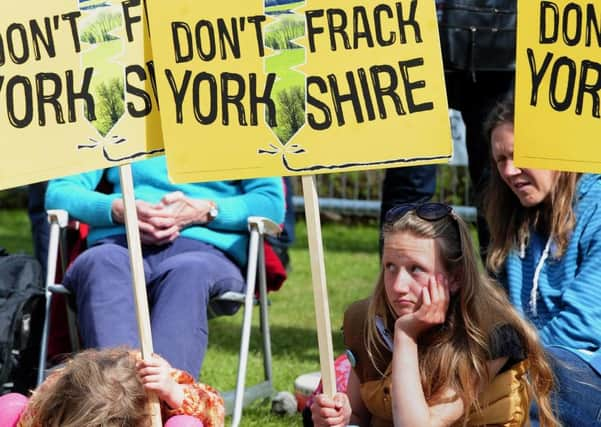Large-scale fracking '˜not compatible with climate change targets'


Extracting shale gas through the controversial process on a significant scale is “not compatible with the UK’s climate change targets” unless three key tests are met, the Committee on Climate Change said.
Advertisement
Hide AdAdvertisement
Hide AdShale operations must prevent methane leaks, while gas from fracking must only replace imports and not push up UK gas consumption, a long-awaited report from the committee warned.
Emissions from shale gas extraction must also be offset by deeper greenhouse gas cuts elsewhere in the economy to make sure the UK stays on track to deliver its legally binding goal of 80% reductions on 1990 levels by 2050.
Measures must be in place to strictly limit emissions of methane - a potent greenhouse gas - from drilling, production and decommissioning of wells, with tight regulation and a close monitoring regime.
Even with controls to limit emissions from extraction and no greater consumption of gas, fracking could produce some 11 million tonnes extra greenhouse gases a year by 2030 - the equivalent to required cuts to agricultural emissions by then.
Advertisement
Hide AdAdvertisement
Hide AdHaving extra emissions from shale and keeping to climate targets “may be possible although it would require significant and potentially difficult offsetting effort elsewhere”, the report said.
It also suggested that the regulatory regime as it stands could lead to higher emissions, warning: “The UK regulatory regime has the potential to be world-leading but this is not yet assured.”
The committee also reiterated its warning that the UK urgently needs technology to capture and store carbon emissions from power stations and industry, as without it use of gas would have to be dramatically reduced to tackle climate change.
The Government has already been warned that it will not meet its “carbon budgets” for slashing emissions in the 2020s and 2030s without more action.
Advertisement
Hide AdAdvertisement
Hide AdProfessor Jim Skea, from the Committee on Climate Change, said: “Under best practice, UK shale gas may have a lower carbon footprint than much of the gas that we import.
“However, gas is a fossil fuel wherever it comes from and is not a low-carbon option, unless combined with carbon capture and storage.
“This report sets out the tests that must be met for shale gas development to be consistent with UK carbon budgets.”
He added that uncertainties over how much of the UK’s shale gas resources were exploitable and the potential size of the UK industry made it “impossible to know how difficult it will be to meet the tests”.
Advertisement
Hide AdAdvertisement
Hide AdOfficials at the Department of Energy and Climate Change (Decc) said they were confident that the Government would meet its carbon budgets, even with extra emissions from shale, and would set out how it planned to do so later in the year.
Government, Environment Agency and Health and Safety Executive officials also said they were on track to deliver the strict regulatory regime to limit emissions from shale gas extraction.
Energy Minister Andrea Leadsom said: “Shale gas is a fantastic opportunity which could create thousands of jobs across the country and a secure home-grown energy source that we can rely on for decades to come.
“We’ve already put measures in place to limit and monitor emissions that meet the conditions set out in this report so we can continue to tackle climate change and take advantage of the benefits this new industry could provide.”
Advertisement
Hide AdAdvertisement
Hide AdShadow secretary energy and climate change secretary Barry Gardiner said that the report, sent to the Government a few months ago, laid out three fundamental tests.
“After dithering for 99 days, the Government has decided to do precisely nothing to increase protection for the public or to deliver security for our climate targets. Three tests and the Government has ducked them all.
“What the CCC is clear about is that unconventional gas brings with it unconventional risks - risks from methane leaks and other potential problems.
“But the fundamental problem with unconventional gas is that it is still a fossil fuel when we need to be directing our energy system towards a zero carbon future.
Advertisement
Hide AdAdvertisement
Hide Ad“The Government’s failure to respond and tighten or clarify existing legislation in this area shows that they are rudderless,” he said, and added it was “currently neither safe nor reasonable to approve any fracking in Britain”.
Greenpeace chief scientist Doug Parr said: “The idea that fracking can be squared with the UK’s climate targets is based on a tower of assumptions, caveats, and conditions on which there is zero certainty of delivery.
“We know that the Government is resisting putting in place policy and regulations needed so that fracking can pass the three climate tests that the Climate Committee is recommending.”
The Government faced a clear choice between promoting “this climate-wrecking industry” or back home-grown renewable energy and smart technologies, he said.
Advertisement
Hide AdAdvertisement
Hide AdThe Government said it believed the tests set by the committee would be met and it was not bringing forward legislation to suspend development of fracking.
The Government also said UK shale development will not impact overall UK gas consumption and that carbon targets would be met.
Friends of the Earth energy campaigner Tony Bosworth said: “The Government has been told that fracking might not be compatible with its climate change targets, but ministers seem to think business as usual is still the order of the day.
“The Government should immediately stop fracking plans until it has assessed whether it can meet the committee’s three tests.”